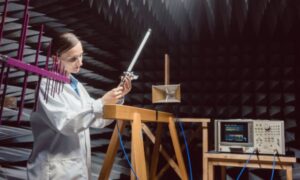
FCC laboratory testing is critical in ensuring electronic products are FCC compliant. FCC laboratory testing subjects products to severe testing to ensure that products are safe and interferes to a level needed before they are released into the market in America. FCC certification is required for any firm willing to lawfully introduce their products into the country without undermining consumer well-being and network performance.
The FCC Certification Laboratory Role
FCC certification test laboratories perform product testing and inspection to establish whether products are in conformity with federal standards. Their area of activity includes:
- Electromagnetic Compatibility (EMC) Testing: Testing to guarantee devices won’t interfere with other electronic devices.
- Radio Frequency (RF) Exposure Testing: Testing the levels of radiation to guarantee that it falls within a safety margin.
- Equipment Authorization: Awarding compliant equipment an FCC certification number.
- Environmental & Safety Compliance: Testing of devices to standard safety regulations.
Most of the manufacturers employ the best FCC certification services in order to help them speed up this process and obtain the necessary approvals effectively.
What to Anticipate under FCC Certification Testing
FCC certification testing incorporates a number of important steps. As a producer, and you would like your product certified, here is what you can anticipate:
1. Pre-Compliance Testing
Prior to submitting products for certification, the majority of the manufacturers perform FCC certification testing so that they can detect and correct potential compliance problems beforehand, thereby making the official approval an easy process.
2. Testing of FCC Certification Labs
A product is brought to an FCC certified laboratory for testing after it is prepared. FCC testing laboratories have the latest equipment to perform radio emission, electrical safety, and electromagnetic interference (EMI) testing.
3. Test Report Generation
Once the testing is done, the laboratory will create a detailed report of compliance status of the product. The report is submitted as part of the FCC certification USA application.
4. FCC Certification Approval & Registration
If the tests are cleared as required, the lab sends the test report to a Telecommunications Certification Body (TCB) for approval. Once approved, the device is assigned an FCC certification number and is legally permitted to be sold in the U.S.
How to Find the Best FCC Certification Services
You must decide on the most suitable FCC certification partner to provide a hassle-free process of certification. Consider the following some of the factors:
- Accreditation: Make sure the lab is FCC-recognized and has industry standards.
- Experience: Choose labs that have experience with FCC certification service.
- Turnaround Time: Choose labs that have a good history of expediting processing to minimize delays.
- Customer Support: A good service provider will provide support during the FCC certification process.
FCC Trust Safety Certification: Made Easy to Comply
Others exceed the level of initial testing and choose FCC trust safety certification, confident that their equipment is high-level compliant and safe. This is best used in industries dealing with high-risk electronic components.
Performing an FCC Certification Search
For companies ready to check compliance for a product, the FCC certification search tool offers access to lists of certified products. Using a certification number input, companies and consumers can check whether a device complies with FCC rule requirements.
Conclusion
FCC certification is a must for those makers of electronic devices ready to enter the U.S. market. Collaboration with qualified FCC certification test labs guarantees federal compliance to avoid expensive fines or market bans. In case you need new product certification or certification of an existing product, the best FCC certification agencies will assist you in the process in a timely and efficient way. Always perform an FCC certification search to ensure compliance and be confident about electronic products.
